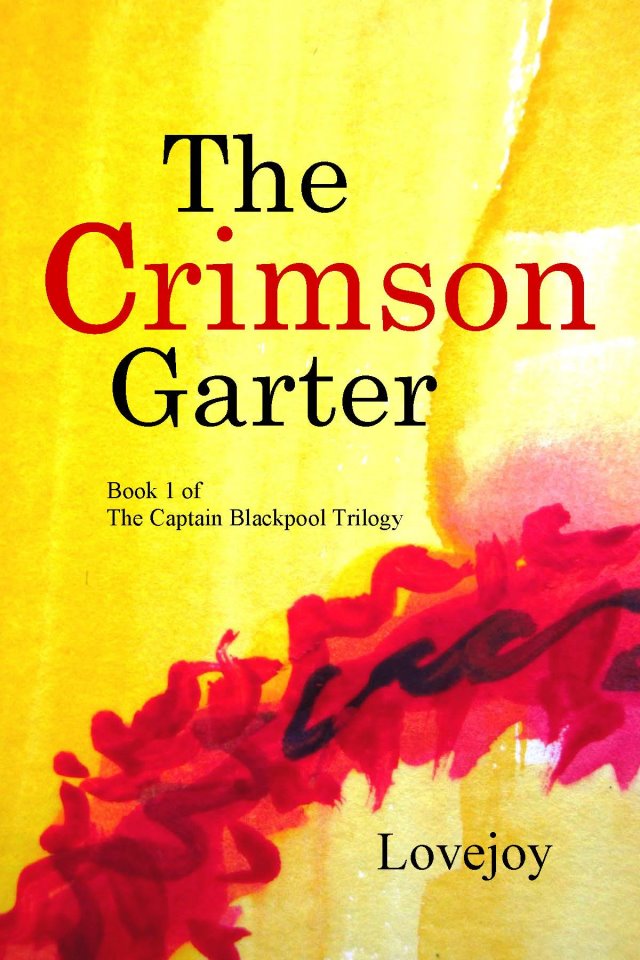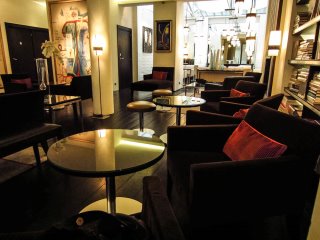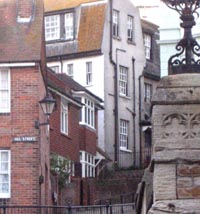
We learn of the bargain between Vittorio Rosetti, Grazia’s brother, and Sir Robert Marsh, that led to the marriage. But now that Vittorio—who had settled in the New World as Rodolfo López after faking his death in Paris—has paid back the debt, he is intent to return to Europe. It was he who had asked Capt Blackpool to follow his sister. The action in chapter six now takes us back to Scotland as we continue The Crimson Garter, by travel editor Stanley Moss, writing pseudonymously as Lovejoy
Chapter 6
Standing aside, Humphrey, Earl of Pinckney made a gallant bow. Grazia strode past him, against the background of the windswept hills, and entered the Manor. What a curious person for her husband to associate with, she thought. He surely embodied all the qualities that Robert found most repugnant: exaggerated gestures, refined but loud clothing, and his overly affected airs. His capacity for revelling in the grand gesture contrasted with Robert’s sobriety and conservatism. Nevertheless his presence had awakened in her longings for city life, which since her return to the Highlands she had repressed with the greatest determination.
How fruitless to dwell upon the past! Once she had arrived in Scotland she sought out duties as befitted the lady of the house, despite the fact that Dorothea Marsh ruled absolutely. Grazia determined to accomplish whatever small chores she had as faultlessly as possible so that Robert would not reproach her. Even seven years after Vittorio’s suicide she still felt a debt of gratitude to the Laird of Marshmoor: had he not allowed her five glorious seasons in Paris while she pursued her career? But what had he gained from the bargain? For five years, he did nothing but pay for her training and support her studies. In five years she had never returned to Marshmoor.
True, she had finally earned a degree of fame, but it was well known that performers were paid a pittance for the fruits of their labour. Marsh neither benefited from her presence at Marshmoor, nor received any relief from the financial burden of her life in Paris, nor had he enjoyed any of the prestige from her success at the opera. He would not acknowledge to his colleagues and acquaintances her true origins, her identity, or her profession. Worse, she was never asked to attend to her wifely tasks. It mystified her that he entered into such a bargain in the first place. And often in Paris she would engage in secret debate with herself: did he love her so much that he would sacrifice himself so completely on her behalf?
It was in part because of this mystery, and a sense of guilt, that she encouraged the kitchen to prepare dishes more inventive than those to which Robert was accustomed. Since she had not attracted his attention by appealing to his heart, then she would attempt communication with his stomach. She cajoled the cook by recounting her own experiences dining out in Paris, embellishing tales of the splendid meals of meats and shellfishes, the fresh fruit and vegetables she found, and the cook was charmed by her. And curiously, her best efforts were then rewarded. Sir Robert Marsh even complimented her on the improvements which were the result of her involvement with the kitchen. He relented and asked his mother to allow a few more coppers be dispensed for the pantry budget in order to obtain better quality goods.
But Dorothea Marsh remained skeptical at Grazia’s intervention. She claimed that the food his wife encouraged was overly rich.
‘Surely this cannot be healthy,’ she opined to her son. ‘Would you prefer that I prepare something else for you, Robert? Or ask cook to make some lovely porridge.’ She complained that the food was too spicy, or too flavourful, and she would instruct from the table that next time it be assembled with less butter or less salt. Grazia endured these vaguely disguised attempts to economize. But she could not bear the criticisms when the same dish was served, having been made with reduced or incorrect proportions. Much to Grazia’s distress, ever more criticism surfaced from the Lady Dorothea. And then she would witness Robert push his plate back and steal away from the table so as to avoid the icy tension that inevitably followed.
Grazia could not content herself with staying cloistered in the vast residence all the time. She found that it helped her to take long walks outside in the hills and heathered fields which surrounded Marshmoor. It was during such a walk that she was accosted by their curious houseguest. Later, as she wandered the lonely halls of Marshmoor again, Grazia remembered some romantic strains of music, and she yearned for the sound of a piano or violin, as she had often enjoyed in her classes in Paris. The manor remained endlessly, terribly silent. An old spinet stood in a cold and dank sitting room in the eastern wing of the house. After her walk she repaired there. The spinet was out of tune and dusty from disuse. Grazia despaired of asking Sir Robert to have someone tune it, for she knew he would protest the cost. She knew enough not to make any excessive demands upon his purse. So she contented herself with playing softly, having grown accustomed to the out-of-tune notes on the keyboard.
As Grazia sat in the music room, Sir Robert, who had controlled himself admirably until he left his mother’s apartment, began to hurtle down the stairs, in search of her, looking to confront her, his mind in a whirlwind at the news just received. With each step he took his anger grew. His frustration increased at every door that he opened, at every empty room he found. ‘Grace!’ he would call, flinging open a door. And when she was not there he would close it forcefully. Again and again, louder and louder, with more and more anxiousness he called out, ‘Grace!’ And when there was still no answer nor Grace to be found he began to slam doors with great purpose. By the time he discovered her in the conservatory he was nearly running, calling ‘Grace! Grace!’ but the walls were thick, and sound did not carry, and so she was startled at his voice and the suddenness of his entry. She immediately halted the minuet she was engaged in, and looked up at him in a very innocent way. ‘My goodness, Robert, whatever can be wrong?’ she asked.
Here Marsh paused, realizing that he presented a very disoriented appearance. He collected himself and said, ‘I noted you out on the heath again and I was concerned for your safety. You have been out in the cold an inordinately long time, I believe.’
‘It is true I have just returned from a walk,’ Grazia said. ‘But Robert, you need not worry about me so much. I do not think that I was gone that long.’
Sir Robert sat down on a chair opposite her. La Fragolina took up the music where she had left off, and finished the piece, which had a melancholy atonal cast due to the poor tuning of the instrument. She closed her sheet music and looked at her husband.
‘You must miss your life in Paris a great deal,’ he finally said.
Since those were her most very recent thoughts Grazia was startled and taken off guard. She wondered if she were so transparent. Sighing, she admitted she had been thinking about her days in Paris.
‘Tell me, are there any new friends whom you are missing, who you have not mentioned to me in your correspondence?’
‘No,’ Grazia replied without hesitation. ‘I think often of Mme Monitchka and my colleagues at the ballet. And I confess that I miss my maid Bernadette very much.’
‘Since all of Paris was talking about your retirement, you must have been fêted, taken out to dinners, you must have been introduced to some new people. Perhaps in the artistic world?’
Her mind alighted on the artist Balthazar, but surely Robert could not know about that brief and fleeting episode. She looked at her husband’s eyes, and her face was clear and untroubled. ‘I saw no new friends, went out with no exciting or important people. You know what my life was, I wrote to you about it. What most preoccupied me in the weeks before I departed was preparing myself to give my finest performance and be remembered well.’
She could not be lying, and Marsh felt instantly ashamed. Perhaps the artist Balthazar had become infatuated with her and had sketched her unbeknownst to her, and then placed her in this lewd setting, the victim of some artist’s irresistible fantasy. Were that the case he was even more determined to protect her, and to avenge the indignity.
‘By the way, I have encountered someone on the heath,’ she offered. ‘A most curious person.’
‘Who?’ demanded Marsh, suddenly quite interested.
‘He called himself the Earl of Pickles, or some such ridiculous name. I did him the courtesy of introducing myself as Lady Grace Marsh.’
‘Did he recognize you?’
‘I do not think so,’ she answered. ‘Though he did repeat the old bromide about believing we had met before. I suppose it some kind of attempt at ingratiating himself, since it was clear I had never laid eyes on the man in my life. He did take the unusual liberty of advising me to drink a glass of port wine for my health!’
‘This is the unfortunate character who has attached himself to me,’ Marsh lamented. ‘He travelled across the Channel with us on the same boat. An irrepressible bore, and one whom I failed to discourage from visiting Marshmoor. I endeavour daily to make life so unpleasant for him that he will return to London, but to no avail.’
‘Robert, since he has now seen me and knows I am your wife, but has not a clue of my life in Paris, would it not be possible for me to sit at the table with you this evening for dinner? I confess that I feel very lonely having to take my meals upstairs. And I have felt especially isolated today.’ Sir Robert experienced a pang of guilt.
‘Why not, Grace? Of course. Tonight you shall have the pleasure of dining with Lord Humphrey, Earl of Pickles.’ Here Marsh gave off with a sarcastic snort. ‘Perhaps you could mitigate his perniciousness. I would be grateful if you would engage his conversation so that I do not need to.’
‘I will do my utmost to deflect his inanities,’ she promised. ‘And I will engage him in the warmest and most irrelevant conversation that I can. Tonight you shall be spared the pain of his banality.’
‘There is another small detail I wish to take up with you,’ he began.
‘Can this concern the dearth of champignons in last night’s sauce?’
‘No, no, my dear,’ Marsh replied. ‘I may have mentioned my interest in a certain library once owned by the Wickham family.’
‘Yes,’ Grazia said. ‘The famous tract by Torvald Herdeg.’
‘The very same!’ Marsh laughed. ‘I have decided to attend an auction in London, and make further inquiries about the Wickham library. Perhaps you would like to accompany me on a short trip there? It will not permit much dallying on your part, Grace. But perhaps it will serve to take the chill from your heart, and rekindle the fire of affection in your breast.’ A glow came over Grazia’s usually pale countenance.
‘Oh, Robert!’ she gasped. ‘London, how divine! I will be able to look in store windows, and perhaps we will find the time to visit Drury Lane and attend a performance …’
‘I think not,’ Marsh grumbled. ‘Time is precious, and theatre is an extravagance. Do not get your hopes up, for my business is brief, and matters here at Marshmoor require a speedy return. But, yes, my bonnie lassie, you shall accompany me to London. Now I must return to my study and attend to some pressing business, or we shall not go at all.’
Here Marsh congratulated himself on his great generosity. Only one more detail remained unresolved in his mind: the compromising painting of his wife, which was causing a stir in Paris. He was unsure in what manner to proceed, and he decided to allow himself the luxury of a pipe, and further consider how the disgusting work should be dealt with.
Once Robert had left for his study, La Fragolina ran her fingers over the discordant keys, congratulating herself for having so successfully soothed her husband. Her delight was immediate. Her mood toward Robert changed. And she looked forward to tonight’s dinner conversation with someone who was at the very least working extremely hard to make himself agreeable.
Letter from Humphrey, Earl of Pinckney
To Amanda Pennington-Smythe
From Marshmoor, Scotland
My dearest dearest Amanda,
I cannot begin to tell you how my heart was warmed by your recent reply. Your persistence in calling me Pinky reassures me that you view me in a particularly affectionate way. So yes, you may use the appellation, but kindly restrict it to our private correspondence, please.
I must report that I finally made the acquaintance of the elusive mistress of Marshmoor, Lady Grace Marsh. Today, as I surveyed the territory for tomorrow’s grouse-beating, to determine the most advantageous position for aiming, I came upon a lonely female figure on a promontory. She was clad in a dark cloak and I could barely see her face in the fading light. As you recall, dear Amanda, the lady of Marshmoor is a very delicate creature. In fact, for the entire voyage across the channel weeks ago I never saw her once. And she has been confined to her chambers since I arrived.
She was so startled by my appearance that she recoiled. She did require some persuasion before she would identify herself to me, but her reluctance to speak further, her fatigue, and exhausted demeanour all led me to understand that this was the first time she had ventured out in the fresh air since recuperating. I immediately offered to assist her back to the manor, and she seemed extremely grateful. She then swooned, and reaching out, immediately took my arm in hers. Under the circumstances I accepted this undue gesture of familiarity and was happy to assist her to the door of the manor. She offered me tea, but I feared that it would put too much strain on her and declined. I advised her that upon returning to her chambers she take a glass of port wine.
I now must end this letter to you, Amanda, my sweet lass, in order to make the afternoon post. Sir Robert has informed me that his wife will attend dinner tonight, a remarkable occurrence, and I will watch to see if she looks much revived for the advice I have given her. Later I will give my account to you of dinner at Marshmoor, and tomorrow, beloved, grouse-beating!
Your most affectionate servant,
Pinky
Related articles hand-picked by our editors
 Off to London, Lisbon,
Livorno, Lille, Lahore
Off to London, Lisbon,
Livorno, Lille, Lahore
Travel editor Stanley Moss updates us on his wanderings, brought
to you by the letter L
photographed by the author
 Two Parisian hideaways
Two Parisian hideaways
Stanley Moss looks at two distinctive Parisian hotels on opposite sides of town, with very different characters
photographs by Paula Sweet and courtesy Hôtel Le A
 Rich in its memories
Rich in its memories
Stanley Moss takes in St Leonards-on-Sea, a charming seaside hamlet
in East Sussex rich in history
photographed by the author
Advertisement
Copyright ©1997–2022 by JY&A Media, part of Jack Yan & Associates. All rights reserved. JY&A terms and conditions and privacy policy apply to viewing this site. All prices in US dollars except where indicated. Contact us here.